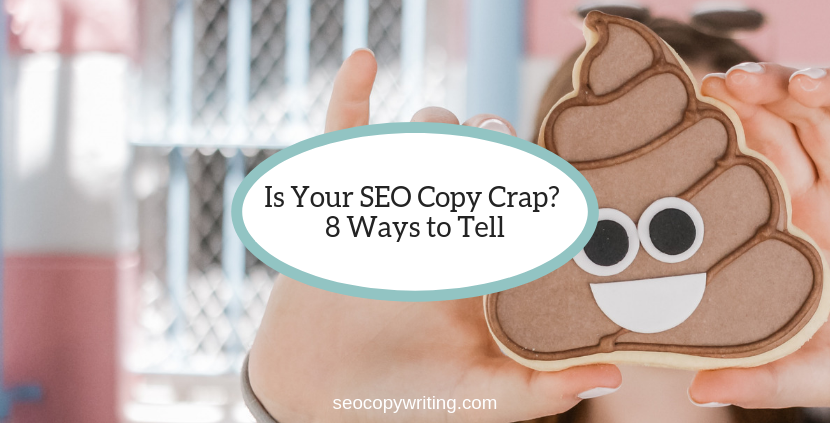Is Your SEO Copy Crap? 8 Ways to Tell
Last week, a prospect asked what I thought of his site copy.
I took one look and resisted the urge to say, “Um, how much did you pay for this?” The writing was…bad. Picture a 500-word, below-the-fold paragraph with no hyperlinks, no call-to-action…and what’s worse…
All of the copy was italicized. All of it.
Imagine reading that on a mobile device.
The prospect knew that something seemed “off.” But he thought, “I hired someone who specializes in SEO copy. Maybe the copy is supposed to read that way.”
Not by a long shot.
Life is too short to pay for bad copy. If your SEO copy sucks, that means that it’s time to send it back to the writer and get her to fix it.
Here’s how to separate the stupendous from the sucky:
– Read the copy out loud and hear how it “sounds.”
If your content sounds clunky — or if the keyphrases stand out like a sore thumb — send it back to the writer. Keyphrase-stuffed copy won’t help you drive traffic (in fact, it will do the exact opposite.) Plus, over-optimization is bad from a conversion standpoint. After all, you don’t want your readers bouncing out of your site as soon as they arrive.
– Understand that good SEO writing is good writing, period.
Do you have the urge to bring out your red pen and slice unnecessary words? Smart SEO copywriting is tight, which means that the writer is using as few words as possible to bring the point home. If you feel like the content is “fluffy,” lacks focus, or misses important elements (such as citing sources), send it back for editing.
– Does the copy make your company’s benefits “pop?” Or is it all focused around features?
Your readers care about one thing: How can your product or service solve their problem. That means your writer needs to transform your company’s features into hard-hitting benefit statements. If your web copy is filled with features (a common problem,) ask for a revision.
Bonus tip: Review how many times the writer used your company name, “we” and “our company.” Ideally, your copy is focused around the word “you” — otherwise, you may sound like a bad date.
– Is the copy focused around one single keyword?
This is old-school SEO writing that will tank your Google positions. Good SEO copywriting is topic-focused, and contains synonyms, related words — and, yes, well-researched keyphrases. Not only should you send this content back to the writer, you should consider if you ever want to work with her again. This kind a mistake is a huge red flag screaming, “Hey, I haven’t updated my SEO content writing methods since 2009!”
– Are there spelling or grammatical errors?
Granted, your writer is human – and things happen. But if you are seeing multiple errors and you’re finding yourself correcting the document, stop. That’s what your writer is supposed to do for you.
– Is there a call-to-action?
This could mean linking to a sales page, another blog post, or encouraging folks to sign up for a newsletter. Your writer needs to weave your site’s (and your page’s) conversion goal into the copy. If they haven’t, it’s time for a rewrite.
– How is your page Title (what appears as the clickable link on the search engine results page.)
Does it include the page keywords? Is it enticing? Or is it a bunch of keyphrases separated by pipes? If you’re thinking, “Hmm, I don’t think I’d click on this result,” send it back to the writer.
– Is the page easy to read?
Long, scrolling paragraphs are visually overwhelming – especially on a mobile device. If the paragraphs are long – and you’re not seeing any subheadlines that break up the text – have your writer check out these SEO writing tips before they rewrite the copy.
What happens if your writer revises the content – yet your SEO copy is still crap? It may be time to let the writer go and find someone else who better suits your needs. Better to take the loss now and move on, then upload crappy copy and suffer the consequences.


The amount of poorly written content on the web is amazing. It’s often one of the main reasons that a website isn’t converting the way that it should. SEO is important, but implementing too many keywords will turn off target audience members, and they are the ones that ultimately determine your success.
Many companies spend a lot of time writing about all the features they offer…. As you mentioned, lots of ” we and our statements.” Copy should focus on the visitor’s needs and how they can be solved.
Ask yourself to finish that “feature” statement by answering the question: “and that means…..” So we can get to the benefit. And that’s what we ultimately should write about.
I wonder if you could answer a question for me. From what I’ve learned content should be at least 500 words long. It’s a problem I’ve had with web designers who don’t want the words to spoil their pretty layout. Obviously a large block of writing is off-putting, but with bullet points, headings and images the content should be easy to read. What do you think?
Hi, Jacqui!
Yup, what you’re dealing with is very common. Studies show that longer content (say, over 1,000 words) sees better social shares, positions, and backlinks. There is a time and a place for short copy. However, if the client’s goals is rankings/links, longer copy is better.
I hope this helps! Thanks!
:)
Thank you for the article.